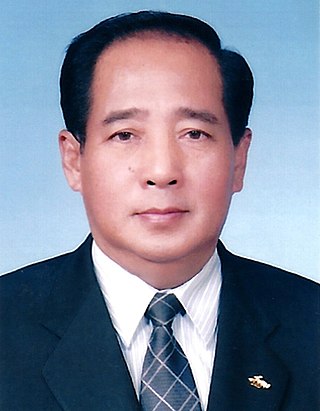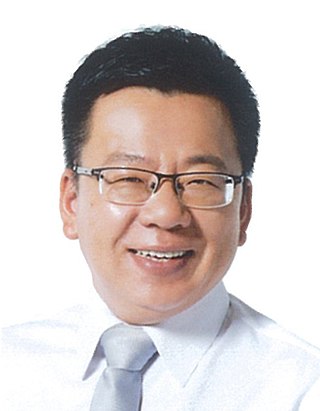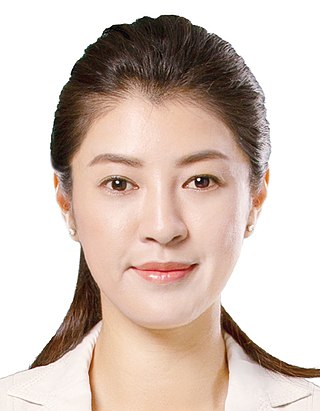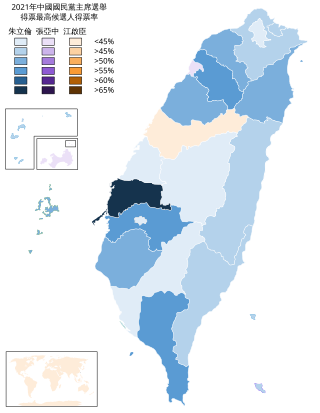
Taiwan, officially the Republic of China (ROC), is governed in a framework of a representative democratic republic under a five-power system first envisioned by Sun Yat-sen in 1906, whereby under the constitutional amendments, the President is head of state and the Premier is head of government, and of a multi-party system. Executive power is exercised by the Executive Yuan. Legislative power is vested primarily in the Legislative Yuan. The judiciary is independent of the executive and the legislature. In addition, the Examination Yuan is in charge of validating the qualification of civil servants, and the Control Yuan inspects, reviews, and audits the policies and operations of the government.

The president of the Republic of China, also referred to as the president of Taiwan, is the head of state of the Republic of China (Taiwan) as well as the commander-in-chief of the Republic of China Armed Forces. The position once had authority of ruling over Mainland China before 1949, but its remaining jurisdictions has been limited to Taiwan, Penghu, Kinmen, Matsu, and other smaller islands since the conclusion of the Chinese Civil War.

The Legislative Yuan is the unicameral legislature of the Republic of China (Taiwan) located in Taipei. The Legislative Yuan is composed of 113 members, who are directly elected for four-year terms by people of the Taiwan Area through a parallel voting system.

The National Assembly was the authoritative legislative body of the Republic of China, from 1947 to 2005. Along with the Control Yuan and the Legislative Yuan, the National Assembly formed the tricameral parliament of the Republic of China.

The Constitution of the Republic of China, also known as the Constitution of Taiwan, is the current constitution of Taiwan and the fifth constitution of the Republic of China (ROC), ratified by the Kuomintang during the Constituent National Assembly session on 25 December 1946, in Nanjing, and adopted on 25 December 1947. The constitution, along with its Additional Articles, remains effective in ROC-controlled territories.

The 2004 Taiwanese legislative election was held on 11 December 2004. All 225 seats of the Legislative Yuan were up for election: 168 elected by single non-transferable vote, 41 elected through party-list Proportional representation, eight elected from overseas Chinese constituencies on the basis of the proportion of nationwide votes received by participating political parties, eight elected by popular vote among the aboriginal populations. Members served three-year terms beginning on 1 February 2005, and ending 31 January 2008. The next term served four years.

An election for the National Assembly took place in Taiwan on Saturday, 14 May 2005, from 07:30 to 16:00 local time. It elected an ad hoc National Assembly whose only function was to serve as a constituent assembly in order to approve or reject amendments to the Constitution of the Republic of China already proposed by the Legislative Yuan. The results indicated that the amendments would be approved, as the parties supporting them won an overwhelming majority, and indeed the amendments were passed on 7 June 2005.

Legislative elections were held in Taiwan on 12 January 2008 to elect the members of the Legislative Yuan. It was the first Legislative Yuan election after the constitutional amendments of 2005, which extended term length from three to four years, reduced seat count from 225 to 113, and introduced the current electoral system.
Referendums in Taiwan at both the national and local level are governed by the Referendum Act of Taiwan, which was enacted by the Legislative Yuan in December 2003. Citizens can propose laws via referendums at the national and local levels. The Referendum Act also allowed people to make changes or abolish laws by referendums.

George Hsieh Kuo-liang is a Taiwanese politician. He is currently the mayor of Keelung City since 25 December 2022.

The New Power Party (NPP) is a political party in Taiwan formed in early 2015. The party emerged from the Sunflower Student Movement in 2014, and advocates for universal human rights, civil and political liberties, as well as Taiwan independence/nationalism. The party is a part of the political phenomenon known as the "Third Force" (第三勢力), in which new political parties, unaligned with traditional Pan-Green or Pan-Blue Coalitions, sought to provide an alternative in Taiwanese politics. Nevertheless, the NPP's policies are very much aligned with and closely match the Pan-Green camp; thus the NPP cooperated with the Democratic Progressive Party (DPP) against the Kuomintang (KMT) in the 2016 elections, going as far as not to run in traditional KMT strongholds to avoid competition with the DPP. The party works in tandem with a perceived generational shift towards Taiwan-centrism as the new socio-cultural norm.

Chiang Wan-an, also known as Wayne Chiang, is a Taiwanese politician who has served as the mayor of Taipei since December 2022. He is the son of former Vice Premier John Chiang, and is believed to be a great-grandson of former President Chiang Kai-shek. He is the youngest mayor of Taipei since the appointment of Chang Feng-hsu.

Chien Tung-ming was a Taiwanese politician. Also known by the Paiwan-language name Uliw Qaljupayare, he represented the Highland Aborigine district for the Kuomintang from 2008 to 2020 at the Legislative Yuan.

Lee Chun-yi (Chinese: 李俊俋; pinyin: Lǐ Jùnyì; Wade–Giles: Li3 Chün4 I4; Pe̍h-ōe-jī: Lí Chùn-ip; born 6 July 1965) is a Taiwanese politician who was elected to the Legislative Yuan as a representative of Chiayi district in 2012. He is a member of the Democratic Progressive Party.

Hsu Shu-hua is a Taiwanese politician serving as magistrate of Nantou County.

The 2021 Kuomintang chairmanship election was scheduled to be held in July 2021. It was postponed due to the COVID-19 pandemic, and eventually rescheduled for 25 September 2021. It was the tenth direct election of the party leader in Kuomintang (KMT) history. All registered, due-paying KMT party members were eligible to vote.
A four-question referendum was held in Taiwan on 18 December 2021. The vote was originally scheduled to take place on 28 August 2021, but was postponed to December due to the COVID-19 pandemic. All four questions were popular initiatives. According to the Referendum Act, referendums can be held once every two years on the fourth Saturday of August and questions must gather a number of signatures equivalent to 1.5% of eligible voters (280,000) in order to qualify.
Events from the year 2022 in Taiwan, Republic of China. This year is numbered Minguo 111 according to the official Republic of China calendar.

Local elections were held in Taiwan on 26 November and 18 December 2022 to elect county magistrates, county (city) councilors, township mayors, township councilors and chiefs of village (borough) in 6 municipalities and 16 counties (cities). Elected officials would serve a four-year term. The election was held alongside the 2022 Taiwanese constitutional referendum.

Chou Chun-mi is a Taiwanese politician and lawyer who is currently Magistrate of Pingtung County, serving since 2022. A member of the Democratic Progressive Party (DPP), she served in the Legislative Yuan from 2016 until 2022.

















